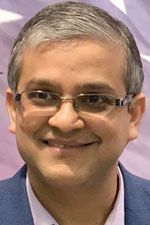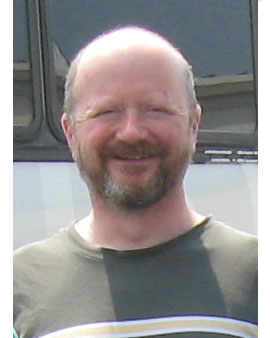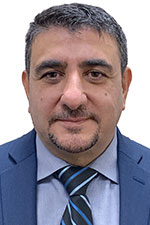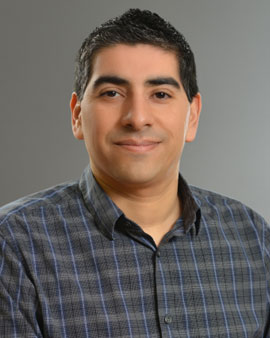Co-Directors
Vikas Bhandawat, PhD
Associate Professor,
School of Biomedical Engineering, Science and Health Systems
Contact
Simon Giszter, PhD
Professor,
Neurobiology & Anatomy,
College of Medicine
Contact
Core Faculty
Research: We study how animal behavior emerges from the complex interaction amongst the animal's nervous systems, their muscle-body dynamics and their environment. We use fruit flies (Drosophila melanogaster) as our model organism because they perform many complex behaviors with a relatively simple brain, and because of the many genetic tools that are available in the flies. We employ a multi-pronged approach which includes in vivo whole-cell patch clamp recordings, imaging, quantitative measurement of behavior, biomechanics, and computation.
Neuromechanics Systems Neuroengineering Computational Neuroengineering
Website:
Bhandawat Laboratory
Faculty Profile:
Drexel School of Biomedical Engineering, Science and Health Systems
Research: Our laboratory focuses on basic mechanisms of motor control in spinal cord, in cortex, and on corticospinal interactions. The focus of our work is particularly on spinal cord modularity in relation to these, and the idea of motor primitives and muscle synergies as building block for functional movements. In addition, we are interested in the role of trunk control and its integration with the limbs, both in normal movement and during recovery from Spinal Cord Injury (SCI), and interested in combinations of bionic and biological and robotic therapies to promote recovery following SCI. Finally, our work involves the design and development of new neurotechnologies for recording and stimulation, especially in spinal cord, and the translation of these as viable Intellectual Property and useful devices.
Neuromechanics Comparative Neuroengineering Translational Neuroengineering Neurotechnology
Website:
Giszter Laboratory
Faculty Profile:
Drexel College of Medicine
Research: Our research interests are mainly in the areas of human and translational neuroengineering. In human neuroenginering, we particularly focus on the integration of neurophysiological sensors, such as functional near infrared spectroscopy (fNIRS), electroencephalogram (EEG), and also eye-tracking for personalized training in safety critical tasks; brain-in-the-loop studies to improve human autonomy teaming and training both in clinical (nurse, surgeon training) and in aviation (autonomous systems); and effects of immersive technologies, such as virtual reality (VR) manipulative interventions on learning. In translational neuroengineering, our laboratory primarily focuses on sensor and algorithm development for anesthesia, sedation monitoring; point-of-care monitoring in prolonged field care including cerebral edema and local tissue oximetry; blood flow measures for hemorrhage assessment and management; and study of biomarkers for the traumatic brain injury.
Human Neuroengineering Translational Neuroengineering
Website:
CoNQuER Collaborative
Faculty Profile:
Drexel School of Biomedical Engineering, Science and Health Systems
Research: Our computational and modeling studies focus on the neural circuits in the spinal cord involved in control of locomotion and the brainstem neural mechanisms responsible for neural control of breathing.
Computational Neuroengineering Systems Neuroengineering Neural Circuit Engineering Neuromechanics
Website:
Laboratory for Theoretical and Computational Neuroscience
Faculty Profile:
Drexel College of Medicine
Research: In the Ausborn Lab, we study the neurophysiological mechanisms of how neural networks process and encode activity to generate appropriate behaviors. To this end we develop detailed, cutting edge models of invertebrate as well as vertebrate neurons and neuronal networks. By integrating a multitude of experimental findings, and often in close interaction with experimental collaborators, our work aims to discover mechanisms involved in sensorimotor integration, neural processing, rhythm generation and the selection and generation of diverse and flexible behaviors.
Systems Neuroengineering Comparative Neuroengineering Computational Neuroengineering Neural circuit engineering
Website:
The Ausborn Lab
Faculty Profile:
Drexel College of Medicine
Research: Dr. Liang's research is focused on neural data science, machine learning, and biomedical natural language processing. The lab uses data science to advance a broad range of topics, including 1) causal discovery in big neuroscience data (spikes, LFP, EEG/MEG and fMRI), 2) machine learning for brain age prediction via integrating genetic, neuroimaging, and clinical data, and 3) deep learning for biomedical text mining, drug labeling review and drug discovery.
Computational Neuroengineering
Website:
Liang Laboratory
Faculty Profile:
Drexel School of Biomedical Engineering, Science and Health Systems
Research: We investigate neural circuits that underlie sensorimotor transformations. We employ and develop novel tools that enable us to reengineer these circuits to understand how they function at the molecular to network level, and to understand the developmental processes that lead to their organization.
Systems Neuroengineering Comparative Neuroengineering Computational Neuroengineering Neural circuit engineering
Website:
Neural Circuit Engineering (NCE) Laboratory
Faculty Profile:
Drexel School of Biomedical Engineering, Science and Health Systems
Research: Our laboratory studies the operation of the neural circuits controlling locomotion. Specifically, we are interested in understanding the connectivity and function of the spinal circuits, how they integrate feedback from somatosensory afferents and commands from supraspinal centers, and how their operation is changed after motor disorders (such as spinal cord injury). We employ computational methods (neural network and musculoskeletal modeling) and work in close collaboration with experimentalists. These computational techniques provide us with excellent tools to investigate dynamic interactions between the different components of the locomotor system and allow us to incorporate a wealth of experimental findings into cohesive, integrated models that can then be used to derive hypotheses and guide future experiments.
Computational Neuroengineering Translational Neuroengineering Neuromechanics Human Neuroengineering Neural circuit engineering
Website:
The Danner Lab
Faculty Profile:
Drexel College of Medicine
Research: Our research is focused on developing therapies including drug delivery, biomaterial scaffolds, stem cells, and therapeutic nanoparticles for applications including neural tissue engineering, spinal cord repair, cardiovascular diseases.
Neural-related Biomaterials Neural Tissue Engineering Brain-computer Interface Translational Neuroengineering
Website:
Zhong Faculty Profile
Faculty Profile:
Drexel School of Biomedical Engineering, Science and Health Systems
Research: We are focused on understanding human brain function using mobile neuroimaging and body sensing in realistic and real-world environments with complex cognitive tasks, across the lifespan and from healthy (typical to specialized groups) to diverse clinical conditions (mental health to neurological). Our lab is part of the Cognitive Neuroengineering and Quantitative Experimental Research (CoNQuER) Collaborative (drexel.edu/conquer), a brain observatory that is equipped with state-of-the-art brain and body sensors, as well as electronic design, assembly and testing facilities for new sensor development.
Neuroergonomics Brain-computer Interface Neurotechnology Human Neuroengineering
Website:
CONQUER Collaborative
Faculty Profile:
Drexel School of Biomedical Engineering, Science and Health Systems
Research: We are exploring AI frameworks that mimic how the mammalian brain senses and understands the world. Our goal is to develop an AI system will learn much like an infant learns, by simply observing the world and learning through observation. Eventually, the model should learn the structure of the world and existing associations, and accurately make predictions. We are using neuromorphic software and hardware concepts such as sparse coding, top-down feedback, spiking neural networks, and neuronal dynamics to create a machine intelligence that has a better understanding of the world in which we live.
Systems Neuroengineering Neuromorphic Engineering Computational Neuroengineering
Website:
Sparse Coding Lab
Faculty Profile:
Drexel College of Computing and Informatics
Research: Dr. Das directs the Distributed, Intelligent, and Scalable COmputing (DISCO) lab at the Electrical and Computer Engineering Department. His research focuses on Machine Learning and Computer Architecture. The DISCO lab uses Spiking Neural Networks (SNNs) to implement biomedical and computer vision applications, which are mapped onto VLSI implementation of the central nervous system, also known as neuromorphic computing. The DISCO lab is currently exploring material characteristics of chalcogenide alloys to implement spiking neurons and bio-inspired learning rules for energy-efficient and reliable neuromorphic computing.
Neuromorphic Engineering Computational Neuroengineering
Website:
Personal Site
Faculty Profile:
Drexel College of Engineering
Research: At the intersection of cognitive neuroscience, neuropsychology, and neuroengineering, the Cognitive Neuroengineering and Wellbeing (CogNeW) laboratory examines how to use neural control to improve cognition. Using network neuroscience techniques, we focus on individual differences in brain-behavior relationships and responses to brain stimulation using anatomical and functional imaging in health and neurological diseases. We also have interests in the fast-emerging developments in neuromodulation and ethical quandries that they can induce. Accordingly, we study the psychology of neuroethical decision making in the public, patients, and clinicians to conduct policy-related research.
Brain-computer Interface Neurotechnology Translational Neuroengineering Systems Neuroengineering Computational Neuroengineering Human Neuroengineering
Website:
CogNeW Lab
Faculty Profile:
Drexel College of Arts and Science
Research: My area of expertise includes differential equations, dynamical systems, probability, and their applications to problems in physics and biology. My research helps to understand how the properties of individual neurons, the types and the structure of connections between them, and noise contribute to formation of activity patterns in large neuronal networks.
Computational Neuroengineering
Website:
Personal Site
Faculty Profile:
Drexel College of Arts and Science
Expert Faculty
Research: We study neural circuit dynamics underlying memory formation, with a focus on hippocampus associated circuitry. Our research employs a multidisciplinary approach, including optogenetics, multi-channel electrophysiology, calcium imaging, closed-loop control, and machine learning.
Systems Neuroengineering Neural Circuit Engineering
Website:
The Wang Lab
Faculty Profile:
Drexel College of Medicine
Research: Dr. España’s research focuses on the neural circuits underlying motivated behavior and the interface between arousal state and effortful responding for natural and drug rewards. Experimental techniques include electrophysiology, optogenetics, chemogenetics, fast scan cyclic voltammetry and a variety of modern genetic tools to interrogate the mechanisms underlying behavior. Evolving projects are focused on closed-loop approaches to query arousal state using electrophysiology so as to guide activation or inhibition of pathways of interest to alter motivation for rewards. Although much of the research surrounds dopaminergic pathways and mechanisms that support substance abuse, discoveries in the laboratory extend to other transmitters systems, pathways and behaviors.
Systems Neuroengineering Brain-computer Interface
Website:
The España Lab
Faculty Profile:
Drexel College of Medicine
Research: The Côté lab laboratory focuses on fostering motor control after spinal cord injury, with a focus on rehabilitative strategies and the underlying mechanisms at play. Our research uses a multidisciplinary approach to reengineer motor pathways after injury and probe their function, including motor training, kinematics and biomechanics, spinal cord stimulation, and other state-of-the-art techniques in electrophysiology.
Neural Circuit Engineering Neuromechanics Translational Neuroengineering
Website:
The Cote Lab
Faculty Profile:
Drexel College of Medicine
Research: The goals of the work in our lab are to reveal the functional connectivity of spinal circuits involved in orchestrating locomotion and to determine how these circuits go awry in injury and disease states. Our current focuses are on mechanisms of locomotor rhythm generation and plasticity following both spinal cord injury and potential treatments for restoration of motor function.
Systems Neuroengineering Neural Circuit Engineering
Website:
The Dougherty Lab
Faculty Profile:
Drexel College of Medicine
Research: We study how injury and rehabilitative exercise modulates pain and sensorimotor function following spinal cord injury. We use a multidisciplinary approach which includes assessments of animal behavior, kinematics and electrophysiology as well as assessments of molecular changes in neuron and immune cell phenotypes.
Systems Neuroengineering Translational Neuroengineering
Website:
Personal Website
Faculty Profile:
Drexel College of Medicine




















